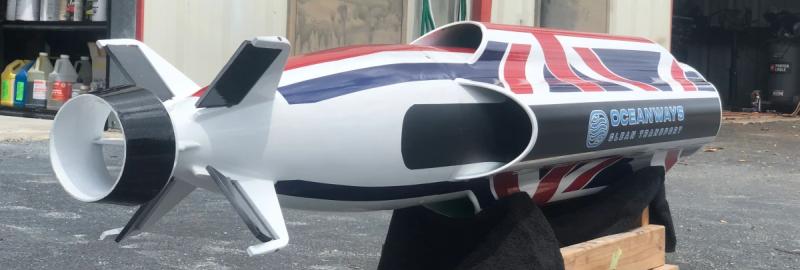 The UK startup, Oceanways, has been awarded funding to develop an autonomous hydrogen/battery-powered submarine in a UK government competition to tackle emissions from shipping.
The UK startup, Oceanways, has been awarded funding to develop an autonomous hydrogen/battery-powered submarine in a UK government competition to tackle emissions from shipping.
The firm has been given £380,000 ($525,000 ) to develop the sub to deliver parcels without a captain or crew. The submarine will follow shipping routes but 50 metres below the surface. When not under the waves, the sub will also be able to deliver goods in shallow waters where container ships can’t operate.
Not only is the new submarine designed to carry an unspecified amount of cargo but it is also intended to collect microplastics suspended in the water column.
The firm awarded the grant has flagged Belfast to Glasgow as a possible route for the submarine. By using hydrogen tech, the company claims that it will eliminate over 1,270 tons of CO2 emissions annually compared to traditional transport options.
The firm claims that a fully automated net positive submarine fleet, powered entirely on green hydrogen, could help cleanse the oceans of toxic pollution by collecting microplastics on its pilot route between Glasgow and Belfast.
What remains unclear, at least to me, from the various news reports and the Oceanways website is how large the final submarine will be and how much cargo it will be able to carry. The prototype photos suggest a medium-sized drone.
The only reference to cargo capacity must be a typo. On their website a prototype, designated Esmeralda01, is described as follows:
Esmeralda01 (EZY01) is getting ready to do her first sea trial. She will be running on hybrid hydrogen & battery power, will be equipped with a three-phase microplastics filtration system to collect microplastics and shall deliver 5kg of cargo emitting zero carbon dioxide and other pollutants.
One hopes that 5kg of cargo is not the design cargo deadweight.
The BBC quotes the firm’s founder and chief executive Dhruv Boruah, saying that the unmanned boat will not be competing with cargo ships, but instead concentrating on “short and sharp” journeys.
But what kind of cargo will the submarine be carrying?
“That’s what we’re going to figure out over the next few months,” he told the BBC’s Good Morning Ulster programme. “I think whisky would be a good candidate.”
The UK’s Clean Maritime Demonstration Competition provides up to £20m million in state funding to support the development of environmentally friendly maritime transport technologies. Global freight shipping currently generates about 3% of total carbon emissions, and the UK aims to lower its share of that to zero by 2050.
Whether “green submarines” will help to achieve that goal remains to be seen.
Thanks to Alaric Bond and Virginia Jones for contributing to this post.

drug mule